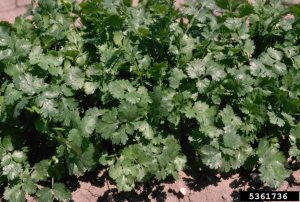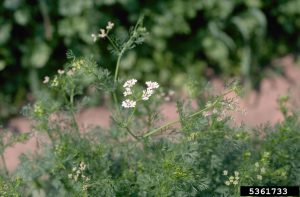
Cilantro (Coriandrum sativum) is a short-lived annual herb with bright green, feathery, flat leaves that look very similar to flat-leaved parsley. Leaves can be harvested at will after they grow to a mature size and then continuously as needed. The flavor of cilantro compliments many Latin American, Indian and Asian dishes and is a great addition to salads. The ripe seeds are known as coriander and used as a spice.
Maybe some of you have grown cilantro, harvested a time or two and then watched in horror as it quickly flowered, went to seed and died. Me, too. This scenario most likely happened in the warm summer months. Hot weather and long days stimulate this annual herb to quickly complete its life cycle. When temperatures increase, it causes plants to bolt which is a sudden switch to producing flowers and seeds, often on tall stalks. After cilantro bolts, the leaves become smaller and less palatable.

The solution is to grow cilantro in the fall and winter. The cooler weather encourages more leafy growth, so you can harvest the leaves for a longer period of time. The warmer weather in the spring will bring flowers, and then seeds to start next autumn’s planting. Collect the seeds and store for planting the following season.
Start cilantro in your garden from seed or transplants. A benefit of growing from seed is that a few seeds can be sown every two weeks to extend your harvest season. Like most herbs, cilantro likes rich, well-drained soils, regular moisture and full or part sun. If the weather is getting warmer, full sun in the morning with some afternoon shade will help keep the herb cooler and less likely to bolt.
For more information:
 0
0
